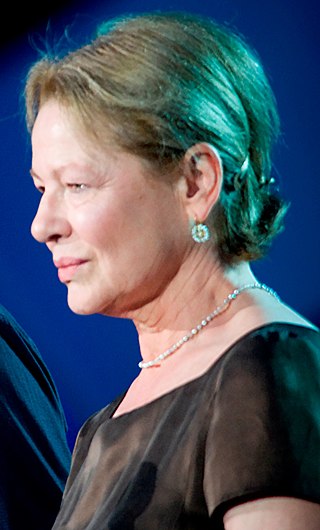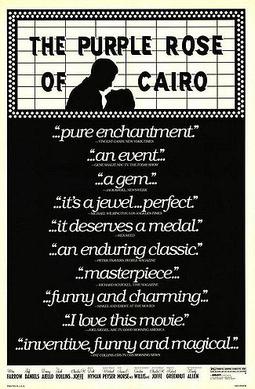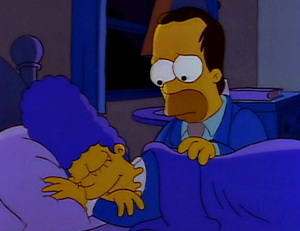
Hannah and Her Sisters is a 1986 American comedy-drama film written and directed by Woody Allen. It tells the intertwined stories of an extended family over two years that begins and ends with a family Thanksgiving dinner. Allen also stars in the film, along with Mia Farrow as Hannah, Michael Caine as her husband, and Barbara Hershey and Dianne Wiest as her sisters. Alongside them, the film features a large ensemble cast.

Thomas Edward Hulce is an American actor and theatre producer. He is best known for his portrayal of Wolfgang Amadeus Mozart in the Academy Award-winning film Amadeus (1984), as well as the roles of Larry "Pinto" Kroger in Animal House (1978), Larry Buckman in Parenthood (1989), and Quasimodo in Disney's animated film The Hunchback of Notre Dame (1996). Awards include an Emmy Award for The Heidi Chronicles, a 2007 Tony Award for Best Musical as a lead producer for Spring Awakening, an Academy Award nomination for Best Actor for Amadeus, and four Golden Globe nominations.

The Birdcage is a 1996 American comedy film produced and directed by Mike Nichols. Elaine May's screenplay adapted the 1978 French film La Cage aux Folles, itself an adaptation of a 1973 play. It stars Robin Williams and Nathan Lane as a gay couple whose son is set to marry the daughter of a conservative senator and his wife. Hank Azaria and Christine Baranski appear in supporting roles. The film marked the first screen collaboration of Nichols and May, who had been a comedy duo in the 1950s and 1960s.

Edward Scissorhands is a 1990 American gothic romantic fantasy film directed by Tim Burton. It was produced by Burton and Denise Di Novi, written by Caroline Thompson from a story by her and Burton, and starring Johnny Depp, Winona Ryder, Dianne Wiest, Anthony Michael Hall, Kathy Baker, Vincent Price, and Alan Arkin. It tells the story of an unfinished artificial humanoid who has scissor blades instead of hands that is taken in by a suburban family and falls in love with their teenage daughter.

Dianne Evelyn Wiest is an American actress. She has won two Academy Awards for Best Supporting Actress for 1986’s Hannah and Her Sisters and 1994’s Bullets Over Broadway, one Golden Globe Award for Bullets over Broadway, the 1997 Primetime Emmy Award for Outstanding Guest Actress in a Drama Series for Road to Avonlea, and the 2008 Primetime Emmy Award for Outstanding Supporting Actress in a Drama Series for In Treatment. In addition, she was nominated for an Academy Award for 1989’s Parenthood.

Junior is a 1994 American comedy film directed and produced by Ivan Reitman, and starring Arnold Schwarzenegger, Danny DeVito and Emma Thompson. The film follows Alex Hesse, an Austrian-American scientist who agrees to undergo a male pregnancy from a newly developed drug Expectane.

The Purple Rose of Cairo is a 1985 American fantasy-romantic film written and directed by Woody Allen, and starring Mia Farrow, Jeff Daniels, and Danny Aiello. Inspired by the films Sherlock Jr. (1924) and Hellzapoppin' (1941) and Pirandello's play Six Characters in Search of an Author (1921), it is the tale of a film character named Tom Baxter who leaves a fictional film of the same name and enters the real world.

"I Married Marge" is the twelfth episode of the third season of the American animated television series The Simpsons. It originally aired on the Fox network in the United States on December 26, 1991. In the episode, Marge worries that she may be pregnant again and visits Dr. Hibbert's office. While anxiously waiting at home, Homer tells Bart, Lisa, and Maggie the story of his and Marge's marriage and Bart's birth. The episode was written by Jeff Martin and directed by Jeffrey Lynch.

Radio Days is a 1987 American comedy-drama film written and directed by Woody Allen. It is a nostalgic look at the golden age of radio during the late 1930s and 1940s, focusing on a working-class family living in Rockaway Beach, New York. The film weaves together various vignettes, blending the lives of the family members with the radio programs they listen to daily. It also features an ensemble cast.

Cookie is a 1989 American comedy film directed by Susan Seidelman starring Peter Falk, Emily Lloyd and Dianne Wiest.

The Associate is a 1996 American comedy film directed by Donald Petrie and written by Nick Thiel. It stars Whoopi Goldberg, Dianne Wiest, Eli Wallach, Tim Daly, and Bebe Neuwirth, alongside Austin Pendleton and Lainie Kazan.

Susan Seidelman is an American film director, producer, and writer. She first came to notice with Smithereens (1982), the earliest American independent feature to be screened in competition at the Cannes Film Festival. Her next feature, Desperately Seeking Susan (1985), co-starred Madonna in her first film, and was named as one of 100 greatest films directed by women by the BBC; it resulted in a Cesar Award nomination. She-Devil (1989) starred Meryl Streep in her first starring comedic film role and Roseanne Barr in her first feature-film role. Her work on the short film The Dutch Master resulted in an Academy Award nomination. Seidelman's subsequent films mix comedy with drama, blending genres and pop-cultural references with a focus on women protagonists, particularly outsiders. She also works in television and directed the pilot episode of Sex and the City.

Educating Rita is a 1983 British comedy-drama film directed by Lewis Gilbert with a screenplay by Willy Russell based on his 1980 stage play. The film stars Michael Caine, Julie Walters, Michael Williams and Maureen Lipman. It won multiple major awards for best actor and best actress and was nominated for three Academy Awards. Caine and Walters both won BAFTA and Golden Globe awards for best actor and actress. The British Film Institute ranked Educating Rita the 84th greatest British film of the 20th century.

One Potato, Two Potato is a 1964 black-and-white American drama film directed by Larry Peerce and starring Barbara Barrie and Bernie Hamilton. The film centers on an interracial romance and was produced and released at a time which such were very rarely openly conducted in the United States, and violated the prevailing social norms of the time.
Parenthood is an American sitcom television series based on the 1989 film of the same name. Executive produced by Ron Howard, the series aired for one season on NBC from August 20, 1990, to August 11, 1991.

Independence Day is a 1983 American drama film directed by Robert Mandel from a script by the novelist Alice Hoffman. It was designed by Stewart Campbell and shot by Charles Rosher. It stars Kathleen Quinlan, David Keith, Cliff DeYoung, Frances Sternhagen and Dianne Wiest.

The Blackwater Lightship is a 2004 Hallmark Hall of Fame made-for-television drama film adaptation of the novel The Blackwater Lightship by acclaimed Irish author Colm Tóibín. It aired on CBS on February 4, 2004. The movie stars Angela Lansbury, Gina McKee, Sean Campion, Dianne Wiest, and Keith McErlean. Lansbury received an Emmy nomination for it in 2004.

Drunks is a 1995 American drama film starring Richard Lewis and directed by Peter Cohn.

Let Them All Talk is a 2020 American comedy-drama film directed by Steven Soderbergh from a screenplay by Deborah Eisenberg. The film stars Meryl Streep, Dianne Wiest, Candice Bergen, Lucas Hedges, and Gemma Chan. Much of the dialogue was improvised by the cast, and Soderbergh shot the film using natural light and little equipment aboard the Queen Mary 2.
Woody Allen: A Documentary is a 2011 documentary television miniseries directed by Robert B. Weide about the comedian and filmmaker Woody Allen. It premiered as part of the American Masters series on PBS. The film covers Allen's career as a standup comedian, sitcom writer, film director, and film auteur. At the 64th Primetime Emmy Awards, the series received two nominations: for Outstanding Documentary Series and for Directing for a Documentary Program.

















